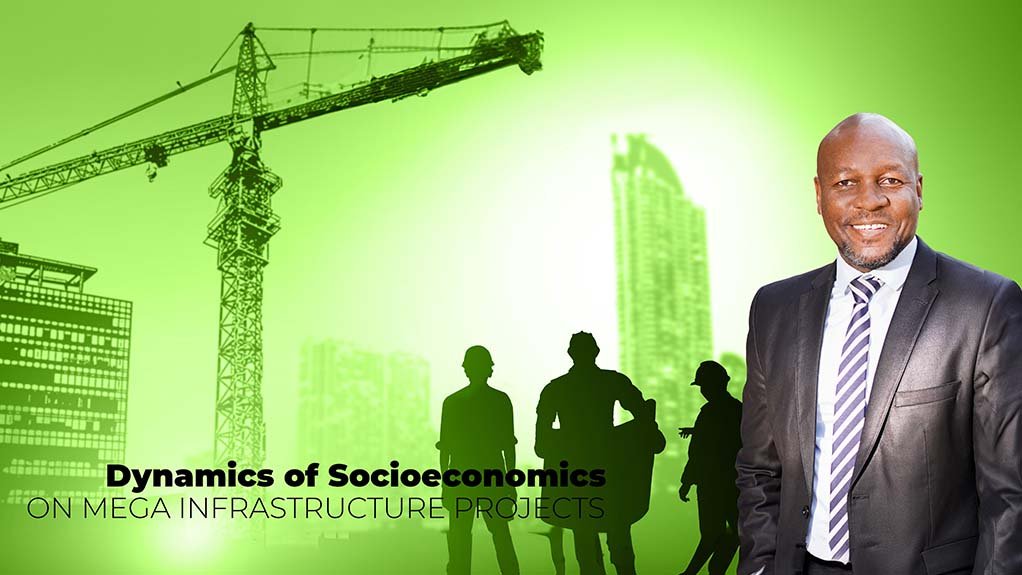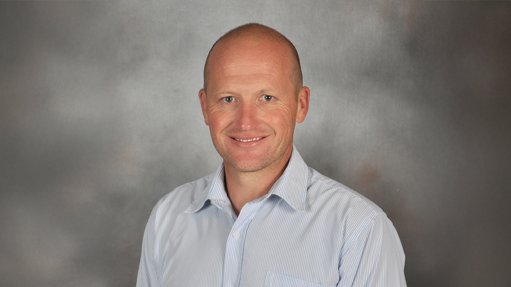Increasing complexity and cost dynamics of socioeconomics on mega infrastructure projects


Author: Dr Mthandazo Ngwenya, MD: Development Advisory and Impact at the Bigen Group.
This article has been supplied.
Many governments recognise the importance of undertaking large-scale and high-impact infrastructure projects as a significant lever to develop their people and allow for expanded access to services. The World Bank estimated that in 2023 Sub-Saharan African countries needed to spend a minimum of 7.1% of their Gross Domestic Product (GDP) on average on Sustainable Development Goals (SDG) related to infrastructure per year but were only spending 3.5% on average annually. A November 2023 report titled ‘Africa must tackle huge infrastructure gap to unlock opportunities for transformation’ by the African Development Bank noted that lack of adequate infrastructure was one of the primary impediments to the realisation of the benefits of the Africa Continental Free Trade Area.
The nexus between infrastructure development and human development is undeniable. At the core of human evolution lies great scientific leaps in the scale and ingenuity of infrastructure deployed by various civilisations over time. The infrastructure differential is the most obvious and notable differentiator between developed and developing nations. Several developing nations lag significantly in terms of the quality and scale of infrastructure such as roads, railways, schools, hospitals, shipping ports, airports, dams, bridges, canals, housing, telecommunications, and many others. This deficit in infrastructure acts as a critical barrier to the ability of citizens, in particular, the youth to reach their full economic potential. If there is one thing most Africans could agree on - we urgently need more infrastructure!
Why if the case for infrastructure development is obvious, are so many large-scale infrastructure projects including projects in other sectors such as mining or agriculture experiencing rising tensions caused by environmental and socio-economic related causes?
This is not a phenomenon limited only to Africa. According to the United Nations Principles for Responsible Investing (PRI) article ‘Building the conversation around social issues in infrastructure investing’, the US$3.8 billion Dakota Access Pipeline in the US, Melbourne’s proposed US$8.8 billion East-West Road link, and the Mexico City international airport are just three of many high-profile infrastructure projects with large capital spends that have encountered strong resistance from civil society, politicians, and regulators. There are significant costs suffered by investors as a direct result of rising tensions due to failure to manage project host communities and other key stakeholder concerns. In the case of the Dakota Access Pipeline, the investors are estimated to have lost US$ 7.5 billion due to delays to construction and cost overruns with many attributable to protest actions and legal challenges to the project.
Some key deficiencies by project sponsors, developers, or governments in the design and commissioning of projects that may lead to rising tensions are:
- Lack of real and meaningful proactive consultation with host communities and ensuring that there is a robust mechanism in place to capture the feedback from communities and communicate back the remedial actions to be considered in the design and execution phases of the project. It is of limited value to consult with host communities as an afterthought when the project has moved to the construction phase and changes in the approved project schedules would impact the critical path and cause significant cost overruns.
- Failure to identify all the project stakeholder’s risks leaving out of your consultation and engagement processes stakeholders who may have a significant impact on the project. In some cases, this error has resulted in projects being cancelled due to opposition from groups who previously had not been identified as strong or influential. It is critical to develop a stakeholder management strategy that identifies stakeholders, defines the risk and reward relationships to the project, defines mechanisms for engagement, and develops risk mitigation plans for each stakeholder group. A well-developed stakeholder management plan defines who the stakeholders are, their degree of influence on the project, the relationships among various stakeholders, how to communicate with them, how often and about what topics, and how to manage any risks emanating from stakeholders, including escalation procedures within the project management team.
- Lack of rigorous and robust processes to manage the delicate issues related to how land will be made available for the project and associated compensation events. Host communities occupy an important part in project development. It is usually the host community whose land is expropriated or leased to the project, and thus, communities may lose valuable range lands. It is the host community that may have family bonds broken due to construction preventing them from travelling through paths they have known for generations, being resettled, having family graves relocated or environmental and heritage sites impacted by construction. It is also the host community that experiences noise pollution and other negative environmental impacts that may be caused by construction. Host communities experience the influx of economic migrants who may at times pose a risk to the culture or social fabric of the area.
- Imprecise definition of the project area to ensure project benefits target the correct stakeholders. Many large-scale infrastructure or mining projects in Africa tend to occur in rural or peri-urban zones. These may be large dams, new mining discoveries, hydroelectric schemes, pipelines, bridges, and so on. The rule of thumb is that host communities are those directly and indirectly impacted by the project and who are located within a 50km radius of the project. A deliberate effort needs to be undertaken to map how these communities will receive direct benefits such as employment opportunities, compensation, sub-consulting opportunities, on-the-job training, and supplying some of the project materials. Most importantly it is host communities that need to take pride and ownership of the infrastructure and play a proactive role with law enforcement to prevent its vandalisation.
- Lack of clear processes and procedures that ensure fair and transparent project procurement, recruitment, and reward processes. Failure to define clear and transparent processes and procedures may risk corrupt politicians, unscrupulous business owners, community leaders, or organised crime syndicates taking control of the project. Stakeholders may perceive the project as being biased, unethical or lacking integrity in its business practices rendering it susceptible to external influences impacting on the project detrimentally.
Though the above is not an exhaustive definition of all the social dynamics on a project that may trigger tensions, the list is robust and covers many recorded causal factors identified based on research. To those in doubt about the real-world impact of social factors on projects, take the case of South Africa where, on the 8th of September 2023, the Minister of Human Settlements announced that over 3400 projects had been blocked by factors such as community protests, land invasions and by criminal syndicates known as the ‘Construction Mafia’.
To achieve the Africa we want, a fundamental rethink is required by all role players engaged in project development to formulate better strategies to integrate the full set of environmental and socio-economic dynamics in project life cycle planning. This will facilitate better relations amongst all stakeholders and achieve harmony, improve investor returns and meet the service delivery outcomes to the people.
Article Enquiry
Email Article
Save Article
Feedback
To advertise email advertising@creamermedia.co.za or click here
Announcements
What's On
Subscribe to improve your user experience...
Option 1 (equivalent of R125 a month):
Receive a weekly copy of Creamer Media's Engineering News & Mining Weekly magazine
(print copy for those in South Africa and e-magazine for those outside of South Africa)
Receive daily email newsletters
Access to full search results
Access archive of magazine back copies
Access to Projects in Progress
Access to ONE Research Report of your choice in PDF format
Option 2 (equivalent of R375 a month):
All benefits from Option 1
PLUS
Access to Creamer Media's Research Channel Africa for ALL Research Reports, in PDF format, on various industrial and mining sectors
including Electricity; Water; Energy Transition; Hydrogen; Roads, Rail and Ports; Coal; Gold; Platinum; Battery Metals; etc.
Already a subscriber?
Forgotten your password?
Receive weekly copy of Creamer Media's Engineering News & Mining Weekly magazine (print copy for those in South Africa and e-magazine for those outside of South Africa)
➕
Recieve daily email newsletters
➕
Access to full search results
➕
Access archive of magazine back copies
➕
Access to Projects in Progress
➕
Access to ONE Research Report of your choice in PDF format
RESEARCH CHANNEL AFRICA
R4500 (equivalent of R375 a month)
SUBSCRIBEAll benefits from Option 1
➕
Access to Creamer Media's Research Channel Africa for ALL Research Reports on various industrial and mining sectors, in PDF format, including on:
Electricity
➕
Water
➕
Energy Transition
➕
Hydrogen
➕
Roads, Rail and Ports
➕
Coal
➕
Gold
➕
Platinum
➕
Battery Metals
➕
etc.
Receive all benefits from Option 1 or Option 2 delivered to numerous people at your company
➕
Multiple User names and Passwords for simultaneous log-ins
➕
Intranet integration access to all in your organisation



















